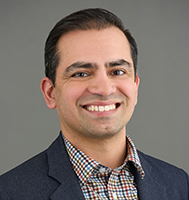Q&A with Neil Munjal, MD, MS, assistant professor, Division of Critical Care
 Hometown: San Jose, California
Hometown: San Jose, California
Educational/professional background:
- BA, Saint Louis University (Biochemistry)
- MD, Washington University in St. Louis
- Post-graduate training in Pediatrics, Child Neurology, Pediatric Critical Care, and Neurocritical Care, Children’s Hospital of Pittsburgh, University of Pittsburgh.
- NIH T32 Post-Doctoral Scholarship, Safar Center for Resuscitation Research, University of Pittsburgh
- MS, University of Pittsburgh (Intelligent Systems Program)
Previous position (title, institution): Clinical instructor, Pediatric Critical Care Medicine, University of Pittsburgh
How would you describe your work to a 5-year-old? I work to teach computers to help us protect sick kids from brain injury.
What is your field of research or area of clinical care, and how did you get into it? I have had long-standing passions for pediatrics, sick patients, brains, and computer science, so I naturally fell into the perfect intersection: using machine learning to build real-time predictors of neurological deterioration in ICU patients.
What attracted you to UW–Madison? The warm community, the impressive vision, and the passion for helping others through the Wisconsin Idea.
What is your favorite thing to do in Madison? Exploring the many wonderful indoor and outdoor activities in the city by bike using our awesome bike infrastructure!
What’s one thing you hope trainees will learn from you and your work? All patients in the ICU are at risk for brain injury and we have entered a new era with tools to prevent, detect, and treat evolving brain injury.
Do you feel your work relates in any way to the Wisconsin Idea? If so, please describe how. Our care for patients does not end in the ICU or the hospital. By joining the Pediatric Brain Care Clinic at the Waisman Center, I hope to continue providing care in integrating our patients back into home, school, and society, no matter where they come from.
What’s something interesting about your area of expertise you can share that will make us sound smarter during video chats and parties? The adult brain makes up 2% of the body’s weight but uses 20% of the body’s metabolism, underscoring how much energy is needed to do all the brain’s calculations. On the other hand, the brain can do all its amazing computations using an estimated power of 20 Watts, less than the peak power usage of a typical energy-efficient laptop CPU. Amazingly, it has been estimated that brains of young children are even more active, they can use more than 50% of their entire resting metabolism on the brain alone!
What are some of your hobbies and other interests? Photography, biking, gardening, microelectronics, soccer, and spending time with my two young kids — the second was born three weeks after we moved to Madison!